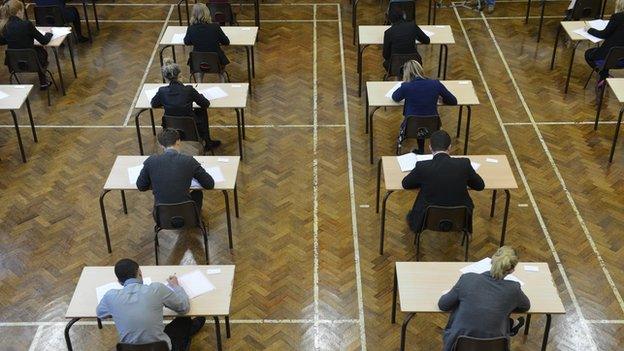Accountancy firm scraps education 'barrier'
- Published

Details of candidates' qualifications and education will only be considered at the end of the recruitment process
A leading accountancy firm is to remove all academic and education details from its trainee application process.
In a bid to boost workplace diversity, Ernst and Young (EY) will choose which applicants to interview based on their performance in online tests.
School-leavers have until now needed the equivalent of three Bs at A-level and graduate applicants a 2:1 degree.
Qualifications "will no longer act as a barrier to getting a foot in the door," said Maggie Stilwell of EY.
In May another major accountancy firm, PricewaterhouseCoopers, announced it would no longer use A-level grades as a way of selecting graduate recruits.
EY has gone one step further by removing the requirement for a minimum degree classification for graduates and hiding all details of schools and universities from the recruiters until the very end of the process so that interviews are carried out "blind".
Applicants will still be asked for their qualifications and education details but none of this information will be available to the recruiters in the first round of interviews.
'Widest' talent
The firm takes on 1,800 trainees each year from 25,000 applicants. Of these, 1,200 are graduate trainees, 400 are undergraduates on internships or placements and 200 are school leavers.
Currently 4% of its most senior staff, external are from ethnic minorities and fewer than one in five are female - but the firm says it is aiming for "a more diverse workplace and leadership pipeline".
It hopes the new system of online "strengths" assessments and numerical tests will mean a wider range of people will apply for the 2016 scheme.
"Transforming our recruitment process will open up opportunities for talented individuals regardless of their background and provide greater access to the profession," said Ms Stilwell.
She said academic qualifications would remain an important part of the recruitment process as a whole but the firm's own research had found "screening students based on academic performance alone was too blunt an approach to recruitment".
Ms Stilwell added: "It found no evidence to conclude that previous success in higher education correlated with future success in subsequent professional qualifications undertaken.
"Instead, the research shows that there are positive correlations between certain strengths and success in future professional qualifications.
"Transforming our recruitment policy is intended to create a more even and fair playing field for all candidates, giving every applicant the opportunity to prove their abilities."
EY's UK recruitment leader, Dan Richards, said the firm wanted "to access the widest and deepest possible talent pools.
"We want to give every candidate the opportunity to demonstrate their strengths and their potential in our selection process," he explained.
- Published4 May 2015

- Published12 January 2015
